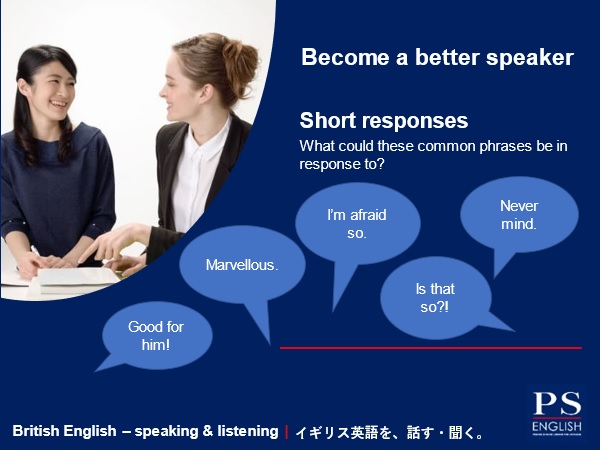Short fixed expressions 2
Our students often ask PS English to help them improve their English conversation skills by making sentences longer. This approach to spoken English will definitely improve your fluency and overall English level, but sometimes in conversation, shorter is better!
In part 1, we briefly described the “catch-ball” difficulty of handling speaking English.

In part 2, we look at some more common short, fixed expressions in English conversation. In part 2, we introduce a new layer of difficulty – understanding ironic use of language with humour. Ironic use of humour is probably universal, but it is often commented upon that the British have their unique brand: subtle humour with a deadpan emotionless delivery.

Are you familiar with these fixed expressions?
Which one is an appropriate response to the stimuli that follow below?
And which one is used ironically?
- Never mind.
- Is that so?!
- I’m afraid so.
- Great.
- Good for him!
- He’s recently been promoted.
- Sorry, I forgot to bring the book you lent me.
- Our company has recently announced a radical permanent change in working practices: 2 days per week of working from home will now be permitted.
- Take your umbrella. It’s just started raining.
- Will the meeting only be conducted in English – no French interpreter this time?
Answers, with sample additional comments:
- He’s recently been promoted.
A; Good for him! He deserves it.
Good for him! – is used when congratulating somebody about a perceived positive change in their life. (Good for you, her, them are all also possible, depending on the context.)
- Sorry, I forgot to bring the book you lent me.
A; Never mind. Next time.
Never mind– is similar to not to worry.
- Our company has recently announced a radical permanent change in working practices: 2 days per week of working from home will now be permitted.
A; Is that so?! Quite a change.
Is that so?! – is used to show genuine surprise upon hearing new infromation.
- Take your umbrella. It’s just started raining
A; Great. Just when I’m about to go out.
Great – this is the ironic example. Here, the communicative intent is to express the opposite meaning of what the word actually means, i.e. NOT great.
- Will the meeting only be conducted in English – no French interpreter this time?
A; I’m afraid so. We couldn’t justify the cost for another interpreter for this meeting.
I’m afraid so – is a very useful alternative to “yes”, when you wish to soften the response. It is like saying “unforfotuanetly, it is true / correct for which you are seeking confirmation.”

